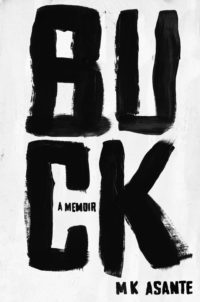CHARACTERS: 4.5/5
WRITING STYLE: 4/5
CLIMAX: 4/5
ENTERTAINMENT QUOTIENT: 4/5
Zimbabwe-born American author, filmmaker, producer M.K. Asante is a household name in the United States.
Son of the widely known Molefi Kete Asante, the famous African American scholar, historian and philosopher, best known for his work on African-American studies and writings on Afro-centricity, M.K. Asante has to his credit not one but three books, with Buck: A Memoir being his fourth.
This memoir of his is an ode to his teen and youth years in Philadelphia, where he reminisces about his past, and about how he came through what was, possibly, the fatefully doomed years of his life.
Though born to successful parents, with his father being a renowned author and his mother running a famous dancing school in Zimbabwe, life for Malo (M.K. Asante) was not as easy as one would have fathomed.
After moving to America with his parents, he went through a bitter and ugly youth; with his elder brother Uzi frequently getting arrested and finally sentenced for having sex with an under-age Caucasian whom he believed to be well above the legal age.
In Uzi’s company Malo learned all that was there to be learnt about the big bad world of drugs, sex, violence and crime and soon after he left, Malo began frequenting the company of Philadelphia’s bad men.
Thus, it was not before long, that Malo found himself skin deep in a world which promised to ruin his life forever.
His ailing mother and ever-absent father also contributed to his lost years in a great deal.
So, did Malo ever make it back to the other side? Did he manage to become a decent citizen or did he become another of that corrupt crowd? Well, the answer to that is for all to see in this beautifully written book.
Coming to what I really liked about Buck: A Memoir, I would like to mention that the way the words come straight from the heart of the author and sound so realistic is one big positive.
For somebody in such a situation, it would be a good motivational and morally uplifting read.
The book challenges the effectiveness of traditional schools and conventional education system, and to a large extent, I found myself agreeing with what the author had to say on the subject.
I enjoyed the inclusion of “rap” phrases from various known-unknown artists in and between the paragraphs; it shows creativity on part of the author and his love for music.
The letters which her mother writes to herself are also very moving and touching.
However, I could not fathom whether they were in real or a product of the author’s imagination.
Buck: A Memoir is really short and crisp and can be read within a matter of three or four hours but that was not the case with me. The reason – I got a lot of new information and every time I came across something new, I kept googling and looking for details and this experience was indeed invigorating. I learned about the author’s dad – Molefi Kete Asante and his works on Afro-centricity.
I got to know about the pathos of the African Americans in America.
I learned about two important episodes of African-American history –
(1) Jesse Owens, the 1936 Olympic gold medalist athlete and the way he was disregarded by Hitler and the then US President Franklin D. Roosevelt and
(2) Emmett Till – the fourteen-year-old who was brutally murdered with his eyes gorged out, headshot through and body tied to a gin fan and disposed of in Tallahatchie river, just because he allegedly flirted with a white woman.
The only thing I did not enjoy much was the use of slang language which, to my great disadvantage, is rather unknown to me.
Also, I was disappointed in the fact that the book covers only a brief phase of the author’s life. It only briefly mentions the recovery phase, and not how he actually comes out of his dark years.
Finally, I would opine that Buck: A Memoir is a great book and conclude with one of the quotes mentioned in the book which was supposedly the source of author’s career inspiration also: “Literature is the most beautiful country in the world” – Jose Marti.
